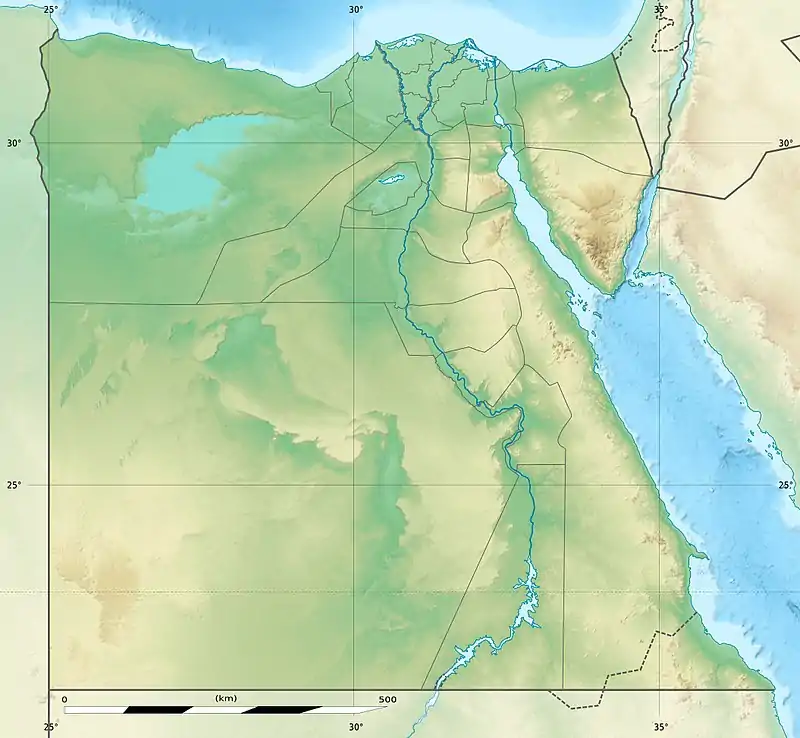Hurbayt
Hurbayt (Arabic: هربيط) is a town in Sharqia Governorate of Egypt.
Hurbayt
هربيط ⲫⲁⲣⲃⲁⲓⲧ | |
|---|---|
 Hurbayt Location in Egypt | |
| Coordinates: 30°44′4.79″N 31°37′14.87″E | |
| Country | |
| Governorate | Sharqia |
| Time zone | UTC+2 (EST) |
It's an ancient town referred to in a stele of the 7th century BC,[1] and described by Herodotus,[2] Strabo,[3] and Pliny.[4]
It served as the capital of the nome of Pharbaethites/Lapt in Lower Egypt.[5][1]
Etymology
The town's Arabic name comes from Coptic Pharbait (Coptic: ⲫⲁⲣⲃⲁⲓⲧ), which in turn is derived from Ancient Egyptian: Pr-Ḥrw-mr.ty, lit. 'house of the two eyed Horus'.[6] It was also known as Sheten (Ancient Egyptian: Štꜣn).[7]
In Ptolemaic and Roman Egypt it was known as Pharbaithos (Ancient Greek: Φάρβαιθος) or Pharbaethus. This name is reproduced under the form Karbeuthos in George of Cyprus.[8]
Ecclesiastical history
The original diocese was a suffragan of Leontopolis, in Augustamnica Secunda, Egypt.
There is a record of Bishop Arbetion at Nicæa in 325,[9] and Bishop Theodorus in 1086,[10] but it is possible that the latter was bishop of another Pharbætus situated further to the west, and which according to Vansleb was equally a Coptic see. John of Nikiu[11] relates that under the Emperor Phocas (602-10) the clerics of the province killed the Greek governor Theophilus.
It remains a Roman Catholic titular see under the name Pharbaetus.
References
- Eugène Revillout, "Acte de fondation d'une chapelle à Hor-Merti dans la ville de Pharbaetus", Revue Égyptologique, 2:1:32 (1881) full text
- II, 166.
- XVII, i, 20.
- Natural History V, 9, 11.
- Karl Baedeker, Egypt: handbook for travellers : part first, lower Egypt..., 1885 (2nd edition), p. 33. full text
- Peust, Carsten. "Die Toponyme vorarabischen Ursprungs im modernen Ägypten" (PDF). pp. 48–49.
- Johnson, Janet H., ed. (2001). The Demotic dictionary of the Oriental Institute of the University of Chicago. Chicago: The Oriental Institute. p. 233.
- "Descriptio orbis romani", ed. Gelzer, 706.
- Gelzer, "Patrum nicænorum nomina", LX.
- Renaudot, "Historia patriarcharum alexandrinorum", 458.
- Chronicle, CV.
Sources
- Charles, Robert H. (2007) [1916]. The Chronicle of John, Bishop of Nikiu: Translated from Zotenberg's Ethiopic Text. Merchantville, NJ: Evolution Publishing. ISBN 9781889758879.
- Attribution
 This article incorporates text from a publication now in the public domain: Herbermann, Charles, ed. (1913). "Pharbætus". Catholic Encyclopedia. New York: Robert Appleton Company. The entry cites:
This article incorporates text from a publication now in the public domain: Herbermann, Charles, ed. (1913). "Pharbætus". Catholic Encyclopedia. New York: Robert Appleton Company. The entry cites:
- Heinrich Gelzer, Georgii Cyprii Descriptio orbis romani, 114–16;
- ROUGÉ, Géographie ancienne de la Basse Egypte (Paris, 1891), 66–74;
- Émile Amélineau, La Géographie de l'Egypte à l' époque copte (Paris, 1893), 330.